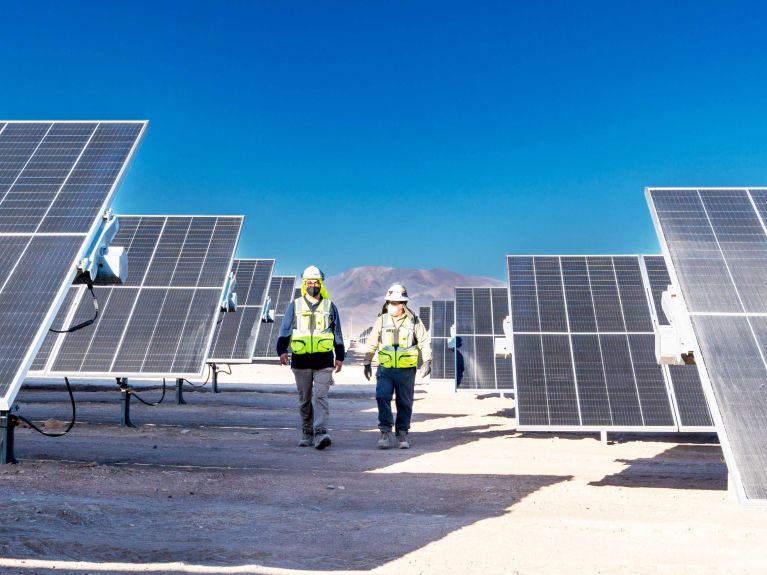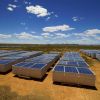Coalitions to combat the climate crisis
Global energy partnerships with Germany are to help secure our future energy supply.

More than 15 years ago, Germany began setting up a global network of energy partnerships with individual countries. It all started in 2006 with India and China, and German companies and universities are meanwhile cooperating with more than 20 countries. The overriding objective of these bilateral energy cooperation agreements is to achieve a climate-friendly, safe and affordable energy supply. It is no longer only about promoting energy efficiency and renewable energies in the countries in question. Establishing a hydrogen infrastructure, supporting the mining of rare earths, and even the issue of cybersecurity are playing an increasingly important role.
Berlin Energy Transition Dialogue
Germany established the Berlin Energy Transition Dialogue (BETD) as a forum for shaping the energy transition at a global level. Since 2015, the German government has invited experts from all over the world to exchange ideas, strengthen partnerships and develop strategies. The BETD has since developed into one of the biggest international dialogue forums on climate change, attended every spring by over 2,000 participants from more than 90 countries, including 50 ministers and secretaries of state for foreign affairs and energy and more than 100 high-ranking speakers. One key objective of the BETD is to strengthen international energy partnerships.
Australia
Germany and Australia have been cooperating closely in the energy sector since 2017. Australia is seen as an important partner when it comes to producing and using green hydrogen. Wind power can be used in coastal regions, while photovoltaic energy can be used in the country’s sunny interior. Obviously, the gas then also needs to be transported to Germany. To this end, the HySupply study has been underway since November 2020. Coordinated by the Federation of German Industries (BDI), Germany’s National Academy of Science and Engineering (acatech) and the University of New South Wales, it is exploring whether a supply chain could be set up – and its findings have been positive so far. The German-Australian TransHyDE project, which was launched in 2022, is researching the extent to which hydrogen can bond with ammonia for transport and subsequently be extracted again. In late January 2023, German Economics Minister Robert Habeck met with his Australian colleague Chris Bowen to decide on further cooperative ventures.
Chile
The German-Chilean energy partnership has been in place since 2019. In signing up to the Paris Agreement, Chile undertook to reduce its carbon emissions by a third by 2030, as compared with the 2007 level. Fortunately, the country has great potential in terms of renewable energies. The Atacama Desert boasts the highest direct solar radiation in the world – twice as high on average as in Spain. Germany is supporting Chile with a number of dialogue and funding programmes, including the “Energy Challenge Germany 2023: German Start-ups for the Energy Transition in Chile”, which involves innovative new companies from Germany developing solutions for the Chilean market. German-Chilean collaboration is set to be stepped up even further with a partnership in the area of natural resources that Federal Chancellor Scholz announced at the end of January 2023. Chile is regarded as one of the leading countries for lithium mining, which is needed for batteries. As Scholz explained, Germany with its high standards is an ideal partner in view of the environmental, labour and social problems in mining, which have caused resentment and thwarted projects in this sector.

Côte d'Ivoire
In 2023, Development Minister Svenja Schulze and Ivorian Finance Minister Adama Coulibaly signed a new climate and development partnership between Germany and Côte d’Ivoire. The new alliance will focus on protecting forests, preserving biodiversity and investing in power grids and solar energy. The Climate and Development Partnership is to ensure that existing forests are better protected. In addition, the Ivorian government will be supported in its ambitious plans to restore up to three million hectares of forest by 2030 and to increase the share of land covered by forest to 20 percent by 2045 (currently nine percent). “Côte d’Ivoire has set itself ambitious targets for climate action and is right to expect international support. This concerns the protection of forests, reforestation and the expansion of solar energy. After all, Côte d’Ivoire has great potential when it comes to renewable energies, and this should be exploited to a much greater extent.
Israel
In March 2022, Germany and Israel signed a joint declaration to cooperate in the energy sector. In the last decade, Israel had begun drilling for offshore natural gas to make the country self-sufficient. Nonetheless, Israel has set itself ambitious climate targets: by 2050, greenhouse gas emissions are to be slashed by 85 per cent compared to 2015. To achieve this, the expansion of renewable energies, partly with the help of German expertise, is to be driven forward. By 2030, just under a third of electricity is to be generated using photovoltaic panels and by extracting kinetic energy from marine currents and ocean waves. Considerable potential for cooperation is also evident in the field of cybersecurity. Attacks on critical energy infrastructure pose a serious threat. Targeted steps are to be taken within the framework of the partnership to improve the resilience of energy systems. Germany also plans to work closely with Israel when it comes to water management in future. Efforts are currently underway to build a pipeline in the Eastern Mediterranean that could link Israel to the rest of Europe via Cyprus and Greece.
Qatar
In 2022, Minister of Economic Affairs Robert Habeck concluded an agreement on a long-term energy partnership between Germany and Qatar. This also involves cooperation in the area of liquid gas. In addition, the two countries are cooperating on the expansion of renewable energies, energy efficiency, electricity market development, grid expansion and the production and trading of green hydrogen. Green hydrogen – i.e. hydrogen produced using renewable energies – is seen as a crucial building block on the way to a more sustainable energy industry. Green hydrogen can be transported as an energy source via pipelines. As a desert state with numerous days of sunshine and a long coastline, Qatar could play an important role here.
Ukraine
Ukraine is one of Germany’s most important trade and investment partners. Since 2020, Germany and Ukraine have also been partners in energy. The most important topics of the partnership are coal transformation, hydrogen, renewable energy, energy efficiency and decarbonisation. The two countries have set ambitious targets for the energy transition. Ukraine aims to achieve a 70 per cent share of renewables in electricity generation by 2050, while Germany wants to achieve at least 80 per cent. The interim target for Ukraine is 25 per cent, for Germany 45 per cent by 2035.
Morocco
Morocco is one of the trailblazers in the area of renewable energies – and not only on the African continent. The country ranks eighth in the 2022 Climate Change Performance Index, just narrowly behind countries such as Sweden and Norway. Morocco already meets 20 per cent of its energy consumption with green hydroelectric, wind and solar power. The country’s declared objective is to increase this proportion to 52 per cent – and in the best-case scenario to 86 per cent – by 2030. An energy partnership with Germany has been underway since 2012 and was recently intensified as part of the German government’s National Hydrogen Strategy, which was adopted in 2021. On the initiative of Germany’s Federal Ministry for Economic Cooperation and Development, an “Alliance for the development of the Power-to-X sector” was agreed, which also includes converting green electricity into hydrogen. One of the challenges in this context is the need for water, which is in short supply in Morocco and has to be produced by means of marine water desalination. Such facilities are currently being built all over the country, in some cases with the support of the Gesellschaft für Internationale Zusammenarbeit (GIZ) and Germany’s KfW Development Bank.
Japan
Renewable energies, energy efficiency, and hydrogen, ranging from its production to its distribution and use, are the key areas in which Japan and Germany want to cooperate more closely. In early 2020, the two partner countries signed their roadmap and set up two working groups for the tasks. Japan wants to become greenhouse gas neutral by 2050.
You would like to receive regular information about Germany? Subscribe here:


